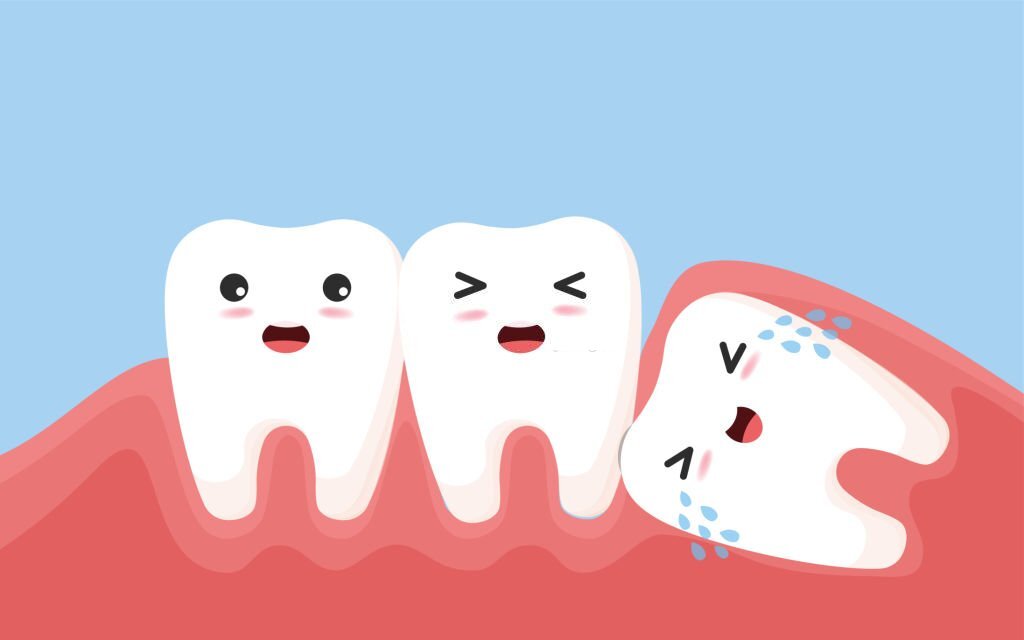Though you have 28 baby teeth that fall out to make room for your adult teeth, you also have four wisdom teeth. Located in the back of your mouth, you have two on each side. Many people have no problems with these teeth, but others experience so many problems that they need to see a dentist. The dentist will take x-rays and may recommend an oral surgeon who will remove the teeth. You may need a surgical procedure if the teeth are impacted. Before you talk to a dentist or orthodontist, take a look at the top seven signs that you need your wisdom teeth removed.

7 Signs That You Need Your Wisdom Teeth Removed
Impacted Teeth
You will likely need your teeth removed if one or more is impacted. This occurs when you have a crowded mouth or large teeth. When your wisdom teeth try to emerge, there isn’t enough space for them. They may come in sideways and cause a lot of pain. Other signs of an impacted wisdom tooth include pain and/or swelling of your jaw and trouble speaking or eating when you try to open your mouth.
Improper Growth
Even if your wisdom teeth are not impacted, you may need them removed because your mouth doesn’t have space for them. A crowded mouth is a mouth filled with teeth close together. If you already have a crowded mouth, you won’t have enough space for your wisdom teeth. You’ll likely feel a lot of pain and notice some swelling around your jaw or mouth.
Sinus Issues
As wisdom teeth are in the back of your mouth, they put a lot of pressure on your sinuses. While this can leave you feeling as though you have allergies, it can also cause so much discomfort that you can no longer work. Sinus problems can include congestion and headaches along with general pain around your nose. If you are seeing the best orthodontist in NYC make sure to mention if you are experiencing this pain. If it is because of your wisdom teeth, they may refer you to an oral surgeon.
Intense Pain
Wisdom teeth can cause so much pain that you have a hard time living your normal life. This pain usually starts around the back of your mouth but can lead to other areas. You may even feel some shooting pain that runs through your jaw and down into your neck or up into your head. Though you can take OTC medications to cope with the pain, the pain will only worsen until an orthodontist removes your wisdom teeth.
Cysts
A cyst is a pocket that forms on the gum with fluid inside. When you experience problems with your wisdom teeth, you may rub your tongue over your mouth and feel one or more cysts. The cyst can damage your nerves and teeth along with your gums if it bursts. Orthodontists often recommend removing the wisdom teeth of patients who have multiple cysts around the backs of their mouths.
Trouble Eating
Problems with your wisdom teeth can also lead to trouble eating. You may feel so much pain and discomfort that you can only eat soft foods like mashed potatoes and pudding because you cannot chew hard foods. Problems with your wisdom teeth can even make it impossible for you to open your mouth as wide as you should. When this occurs, you need the teeth removed.
Frequent Infections
Another sign that you need your wisdom teeth removed is when you suffer from frequent infections. The problem with your teeth is that they cause so much pain and discomfort that you cannot brush or floss. These simple activities make the pain worse and can also make your gums bleed. Your risk of developing cavities will also grow up when you cannot care for your teeth. Your orthodontist may decide to remove your wisdom teeth because it will help you take better care of your teeth once you heal.
Many people live long and happy lives without their wisdom teeth. An orthodontist can remove them during your teen years when they do not erupt or in your later years if they cause you constant problems. Before speaking to your orthodontist, see if you show any of the seven signs you need your wisdom teeth removed. These signs can include cysts that form around the teeth and trouble eating along with intense pain and frequent dental infections.







